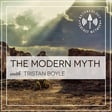
Saving Mes Aynak, Cultural Heritage in Conflict with Brent E Huffman -Ep 22
10 Years ago, Brent was interviewed by Tristan about the film Saving Mes Aynak and now they are reuinted in podcast form once again.
Across the world, cultural heritage faces the threat of human development, for things like housing or resources. 10 years ago Saving Mes Aynak was a film about a Buhddist archaeological site of the same name in Afgahistan and followed the stories of Afgan archaeologists in their attempts to record and perserve the archaeological record under the threat of the Taliban and more directly, a Chinese mining company, looking to extract copper from the area.
In this episode, Brent recounts his time filming Saving Mes Aynak and reflects on the political changes in the country since then. Also discussed in his current project, which is about cultural heritage under threat, and telling the stories of the people who are attempting to rescue it.
Links
Contact
- Discord: ArchaeoWave
- X - anarchaeologist
- Instagram - theanarchaeologist
- Music - Modern Myth - Danny Boyle
- tristan@archaeologypodcastnetwork.com
ArchPodNet
- APN Website: https://www.archpodnet.com
- APN on Facebook: https://www.facebook.com/archpodnet
- APN on X: https://www.twitter.com/archpodnet
- APN on Instagram: https://www.instagram.com/archpodnet
- Tee Public Store
